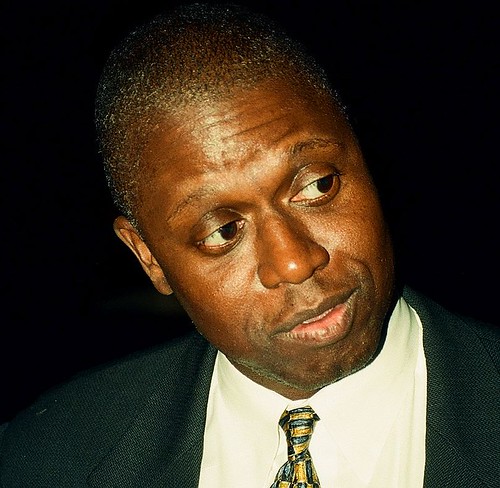Appreciation: In drama and comedy, in roles big and small, Andre Braugher commanded the screen
Andre Braugher #AndreBraugher

I cannot think of the name Andre Braugher, who died Monday at age 61 after a brief illness, without putting an admiring adjective before it — the great Andre Braugher, the mighty Andre Braugher, the marvelous Andre Braugher, in capital letters, with fancy serifs as on an old theatrical poster.
Whatever sort of part he was playing, and he played all sorts, he commanded the screen — even when his characters might be far from commanding. For an actor who worked all the time, his appearance was somehow always an event.
And always a pleasure. He was lovely to look at — People magazine named him one of the world’s 50 most beautiful people in 1997 — and wonderful to hear. Distinctive and distinct, with a sharp edges and a warm body, his was a voice to get close to, to let slide across you.
Before there was David Simon and “The Wire,” there was “Homicide: Life on the Street,” that other great story of Baltimore cops and criminals created by Paul Attanasio from Simon’s journalism. Running from 1993 to 1999, it was the finest police procedural of the late 20th century and better than most everything since. Though it was an ensemble piece with an exceptionally strong cast, Braugher — who had eased into the genre as Telly Savalas’ sidekick in five “Kojack” TV movies — was inarguably its star. (That he won an Emmy as lead actor in a show without leads should tell you something.)
As Det. Frank Pembleton, upright, intense, intellectual, philosophical, confrontational, Jesuitical, “legendary” within the world of the show, he was the series’ gravitational center, a brilliant detective and a psychologically acute interrogator. Long scenes with a suspect in the “ Box” gave him plenty of room to stretch out, to play with tone and to talk. (When the writers gave the character a stroke at the end of the fourth season, which affected his speech, it made for good drama but less good Pembleton.) He made that show, which for some insufficiently good reason is currently impossible to see, unmissable.
Attacking lines rhythmically, often at high speed, sending packets of thought into the world, Braugher could make the most vernacular speech Shakespearean without sounding one whit less the product of Chicago’s West Side that he was; indeed, he had trained at Juilliard and across the years appeared onstage in “As You Like It,” “Measure for Measure,” “Twelfth Night” and “Coriolanus,” as Claudius in “Hamlet,” the lead in “Henry V” (for which he was awarded an Obie) and as Iago opposite Avery Brooks in a 1990 Black-on-Black 1990 production of “Othello.” (The Washington Post called him “supple.”)
At the opposite end, though not the end, of Braugher’s suddenly abbreviated career came a policeman in a different key, and the role for which he might be currently best known, Capt. Raymond Holt across eight seasons of the workplace comedy police procedural “Brooklyn Nine-Nine.”
Amid a cast of eccentric characters written and played toward comic extremes, Holt — New York’s first gay, Black police captain — is the anchor, the rock, still center, and Braugher, his timing impeccable, is extremely funny underplaying straight, and as a straight man. He is delightful in his containment, and when he lets himself get (a little) loose now and again, the effect is doubly funny.
In between, there was notably a civilian role in the great and underappreciated “Men of a Certain Age,” a comedy drama with Ray Romano and Scott Bakula as three very different best friends facing life in their 40s. Where Braugher is often associated with characters of authority and self-possession, his Owen Thoreau Jr. is an anxious man, diabetic, a father of three, whose life has run into a rut, working as a car salesman for a demanding, demeaning father. Here he softens up and slows down, and we get to see him in a family context.
And lately, he joined “The Good Fight” in its final season as Ri’Chard Lane, a puckish, flamboyant, ostentatiously pious lawyer in bright suits and fancy eye wear who breezed into the offices of STR Laurie and started reordering the place.
And although he had come to that point in a career where one might expect him to appear in roles especially tailored to his gifts, it seemed very much an Andre Brauger role — which might be only to say that whatever role he played became, by virtue of the timbre of his instrument, the intelligence of his interpretations, the rhythms of a speech, an Andre Braugher role. Which is to say, in turn, sadly, that we will have no more Andre Braugher roles.
If there’s such a thing as a classical TV actor, one who imbues the medium with a formal rigor from part to part, who makes every thought clear and syllable sensible, Andre Braugher was that actor.